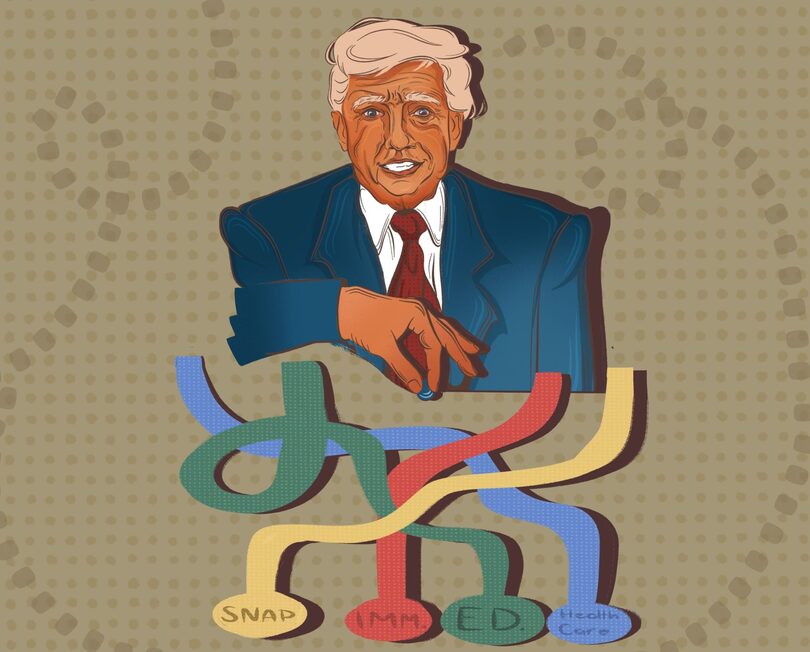Opinion: After shutdown, U.S. should turn to other countries’ models of stability, care

The government shutdown normalizes a dangerous pattern and affects millions, our columnist writes. Instead, the U.S. should mirror other countries’ pattern of shorter-term solutions to protect its citizens. Emma Soto | Contributing Illustrator
Get the latest Syracuse news delivered right to your inbox.
Subscribe to our newsletter here.
The longest government shutdown in United States history has left millions of Americans scrambling to make ends meet.
On Sunday night, the Senate reached a deal to end the shutdown by Thanksgiving, but that won’t undo the unnecessary harm Americans endured over the last month. In fact, it may cause more problems than it solves.
The threat and reality of shutdowns have become an increasingly common and longer-lasting, normalized aspect of American politics despite the cost to millions of people.
It’s worth noting that other countries don’t shut down their governments when a budget isn’t enacted. Instead, they find shorter-term solutions like operating the government at the amount budgeted the year before.
If revenues can’t cover the cost, countries like Germany have a system that allows a percentage of the previous year’s budget to be borrowed. While this isn’t a perfect solution and likely has problems of its own, it’s much better than holding millions of people’s livelihoods hostage.

Katie Crews | Design Editor
In Syracuse, air traffic controllers at Syracuse Hancock International Airport have been working overtime to keep the airport functioning with half of its usual staff. The airport went so far as to hold a food drive for its nearly 200 employees working without pay. It shouldn’t be the responsibility of people who’ve likely also been affected by the shutdown to keep their fellow citizens fed.
When around one-third of Americans say the shutdown is affecting them in one way or another, the government must find a way to do its job and support its citizens.
Over 1 million people missed paychecks, and organizations designed to help people in times of need, like food banks, were stretched thin before the shutdown and are now seeing demand they can’t possibly meet.
Even now, with a potential reopening of the government on the rise, the problem isn’t solved. Democrats sacrificing extended Affordable Care Act subsidies in exchange for a reopening will only cause further harm to the over 20 million Americans who rely on the ACA to afford their insurance, and as a result, could have to pay more than double the cost of their current premiums.
For people who’ve spent the last month worried about job security and where their next meal will come from, this news is likely not a relief if they also rely on the ACA.
There is no point in shutting down the government just to not accomplish the whole reason it shut down in the first place.
Congress agreed to vote on extending the subsidies in December, but with Republicans in control of both chambers of Congress, it’s unlikely Democrats will get the result they want, and millions of people will be left unable to afford their healthcare.
Some argue that Democrats should’ve held out on reopening the government to guarantee that the subsidies would be extended, but keeping the government closed would’ve only deepened the harm already done; it’s a lose-lose situation.
At some point, we have to realize that there must be a better way of governing than having the entire country come to a halt when Congress can’t agree on a budget. The funding bill passed by the Senate is only good until Jan. 30, and then we’ll likely be right back where we started.
Short-term fixes like this don’t solve the underlying issue of the law allowing shutdowns to occur. Each stopgap deal keeps the lights on a little longer, but never addresses why our government keeps breaking apart.
If other countries can figure out how to keep their government functioning while they work on a budget, so can we. We need a system where people’s livelihoods aren’t used as bargaining chips and actual progress can be made, rather than the rinse-repeat cycle of everything grinding to a stop when Sept. 30 rolls around and it’s time to figure out how to fund the government.
What this shutdown has done, more than anything, is show how fragile our trust in government has become. People are tired of watching their lives be disrupted because of a system that prevents effective governance. They want stability: a government that functions without holding paychecks, healthcare and public services hostage every time there’s a budget fight. Finding a better way to govern is about more than just preventing another shutdown: it’s about rebuilding a system so that the government actually starts working for the people, rather than against them.
Emma Donohue is a sophomore studying political science and citizenship and civic engagement. She can be reached at efdonohu@syr.edu.





